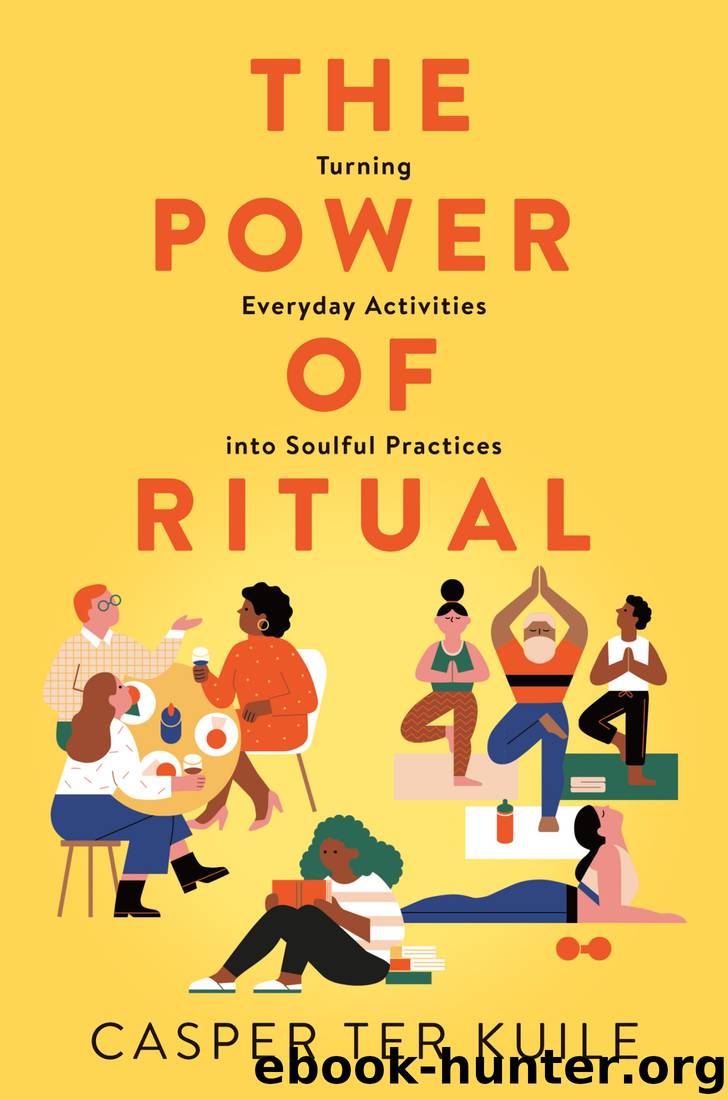The Power of Ritual: Turning Everyday Activities Into Soulful Practices by Casper Ter Kuile

Author:Casper Ter Kuile [Kuile, Casper Ter]
Language: eng
Format: epub
ISBN: 9780062882066
Google: il6xDwAAQBAJ
Amazon: 0062881817
Publisher: HarperOne
Published: 2020-06-22T23:00:00+00:00
DECENTERING YOURSELF
The final practice to explore through fitness is the process of decentering yourself and focusing on a larger, connected collective. A 2012 study by Russell Hoye, Matthew Nicholson, and Kevin Brown showed that even a low degree of involvement in team sport was associated with increased social connectedness for individuals. Though the most obvious examples are team sports like soccer, you might also recognize that feeling if you’ve ever had help moving house—forming a human chain, carrying endless boxes back and forth. Or crossing turbulent water while white-water rafting, getting down in a Zumba class, or letting loose on the dance floor. When we’re in the rhythm of the collective, we can be freed of our isolationist perspective. For a brief period of time, the lie of our separateness is exposed, and we remember that we are wholly connected to one another. It’s not that our individuality disappears, but that we are no longer blinded by individualism. That’s why finding an exercise community can foster a sense of belonging that replicates what religious groups once did. Think of congregations singing together or the Sufi tradition of whirling together.
One fitness community that has taken the practice of decentering oneself seriously is the November Project. In particular, they’ve created a culture of accountability whereby participants start to move from showing up for themselves to showing up on behalf of one another. It all started in 2011, when cofounders Brogan Graham and Bojan Mandaric, both Northeastern University crew alumni, made a commitment to each other to work out every single day at 6:30 a.m. through the cold month of November. The habit stuck, and quickly friends began to join. What started in Boston has now grown to forty-nine cities around the world. Showing up for one another is at the core of what makes November Project work, because who really wants to meet in the rain, cold, or even snow at 6:30 a.m. to run up and down stadium steps?
The November Project has developed two key rituals for participants so they can keep putting one another at the center and keep one another honest. Each week a ceremonial stick, known as the Positivity Award, is given to the person who has most benefited the community and the wider city. Made from a sawn-off rowing oar, it symbolizes the sometimes difficult-to-see work of steering a boat, shifting direction, or doing some extra paddling to keep everyone afloat. Every time it is awarded, the recipient receives huge cheers and hugs from the tens, or hundreds, of people who have shown up. Often there are tears of joy and appreciation.
But the carrot of motivation is only one side of the story. If friends promise one another that they’ll show up but then break their word, their names are listed publicly on the website with a note of (loving) accountability. One example from New York includes multiple pictures of Mary, who didn’t show, and reads, “Mary, last night you dropped a verbal [commitment] to Aliza via text that you would meet her to run together to the workout.
Download
This site does not store any files on its server. We only index and link to content provided by other sites. Please contact the content providers to delete copyright contents if any and email us, we'll remove relevant links or contents immediately.
The Lost Art of Listening by Michael P. Nichols(6474)
Why I Am Not A Calvinist by Dr. Peter S. Ruckman(3771)
The Rosicrucians by Christopher McIntosh(3050)
Wicca: a guide for the solitary practitioner by Scott Cunningham(2705)
Signature in the Cell: DNA and the Evidence for Intelligent Design by Stephen C. Meyer(2501)
Real Sex by Lauren F. Winner(2476)
The Holy Spirit by Billy Graham(2418)
To Light a Sacred Flame by Silver RavenWolf(2354)
The End of Faith by Sam Harris(2291)
The Gnostic Gospels by Pagels Elaine(2027)
Nine Parts of Desire by Geraldine Brooks(2007)
Waking Up by Sam Harris(1958)
Heavens on Earth by Michael Shermer(1955)
Devil, The by Almond Philip C(1900)
Jesus by Paul Johnson(1887)
The God delusion by Richard Dawkins(1848)
Kundalini by Gopi Krishna(1824)
Chosen by God by R. C. Sproul(1761)
The Nature of Consciousness by Rupert Spira(1689)
